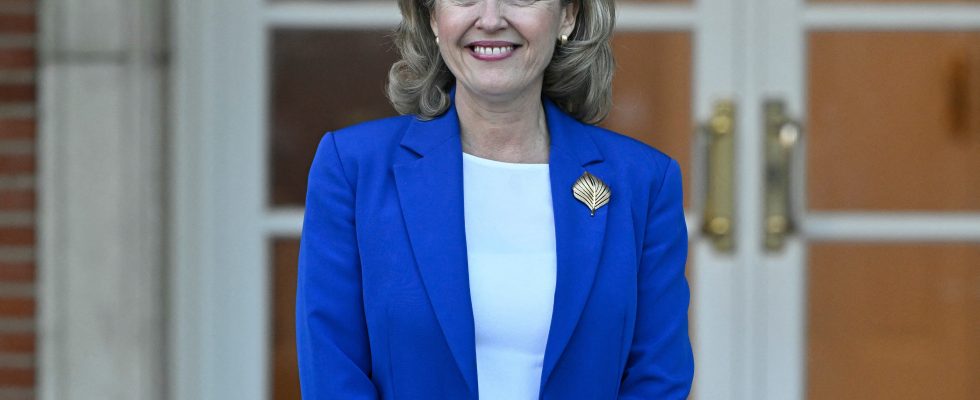“We have reached a conclusion and a consensus around the candidacy of Nadia Calviño for the presidency of the EIB,” declared this Friday, December 8, the Belgian Minister of Finance Vincent Van Peteghem – whose country holds the rotating presidency of the board of governors of this financial institution – following a discussion by the 27 EU Ministers of Economy and Finance meeting in Brussels.
The Spanish Minister of the Economy Nadia Calviño combines the profile of a technician experienced in the mysteries of the EU with that of a pragmatic politician, comfortable in the balance of power. Since its creation in 1958, the European Investment Bank has had seven presidents. But “all men and no Spaniards”, regretted this 55-year-old economist, saying she wanted to become the first woman to head this institution considered the financial arm of the EU.
Objective achieved: appointed by the European Ministers of Economy and Finance against the Dane Margrethe Vestager and the Italian Daniele Franco, Nadia Calviño will succeed the German Werner Hoyer, whose second six-year mandate expires at the end of the year. Enough to establish the international stature of this minister who has established herself since her entry into politics five years ago as a heavyweight in the Spanish left-wing government, of which she embodies the liberal wing, guarantor of budgetary orthodoxy against the radical left.
Polyglot and passage to Brussels
Daughter of the lawyer José María Calviño Iglesias – appointed in the early 1980s as head of public television by a socialist government – Nadia Calviño was born in 1968 in La Coruña, a port city in Galicia (north-west). She grew up in Madrid, where she studied economics, then law. Entering the senior Spanish civil service after her studies, this pragmatic expert held management positions in the Ministry of the Economy, both under the conservative Prime Minister José María Aznar and under the socialist José Luis Rodríguez Zapatero.
Fluent in English, French and German and having worked as an interpreter to finance her studies, she left in 2006 for Brussels, where she notably served as Director General of the Budget of the European Commission. Her political career began in 2018 when Pedro Sánchez, just named Prime Minister after overthrowing the conservative Mariano Rajoy in Parliament, offered her the Ministry of the Economy, with the status of vice-president of the government.
The choice of this technocratic profile aimed to send a signal of stability to the markets, skeptical of the heterogeneous majority brought together by the socialist. A successful bet, despite the constant tensions between Nadia Calviño and radical left ministers within the executive.
Criticism of the lack of parity in circles of power
Since 2018, this fan of 1950s cinema, portrayed as cordial but tough in negotiations, has had the difficult task of managing the Spanish economy in the face of the Covid crisis, which caused a free fall in the country’s GDP, then consequences of the war in Ukraine. With some success: Spain having managed to become one of the most dynamic economies in the euro zone since 2022, with 5.5% growth last year and inflation among the lowest in the euro zone (3 .2% in November year-on-year, after a drop to 1.9% in June).
Smiling during her interventions in a always measured tone, this mother of four children failed in 2020 to take the head of the Eurogroup, despite the campaign led by Madrid with its European partners. On the other hand, she was chosen in December 2021 to chair the Monetary and Financial Committee of the IMF.
Nadia Calviño stood out in May 2022 for refusing to be photographed alongside several business leaders during an economic forum in Madrid, after noticing that she was only surrounded by men . The lack of parity in circles of power is “a question that we must take seriously” and which is “fundamental from the point of view of the proper functioning of our societies”, she explained, promising never to participate in debates where she would be the only woman.
